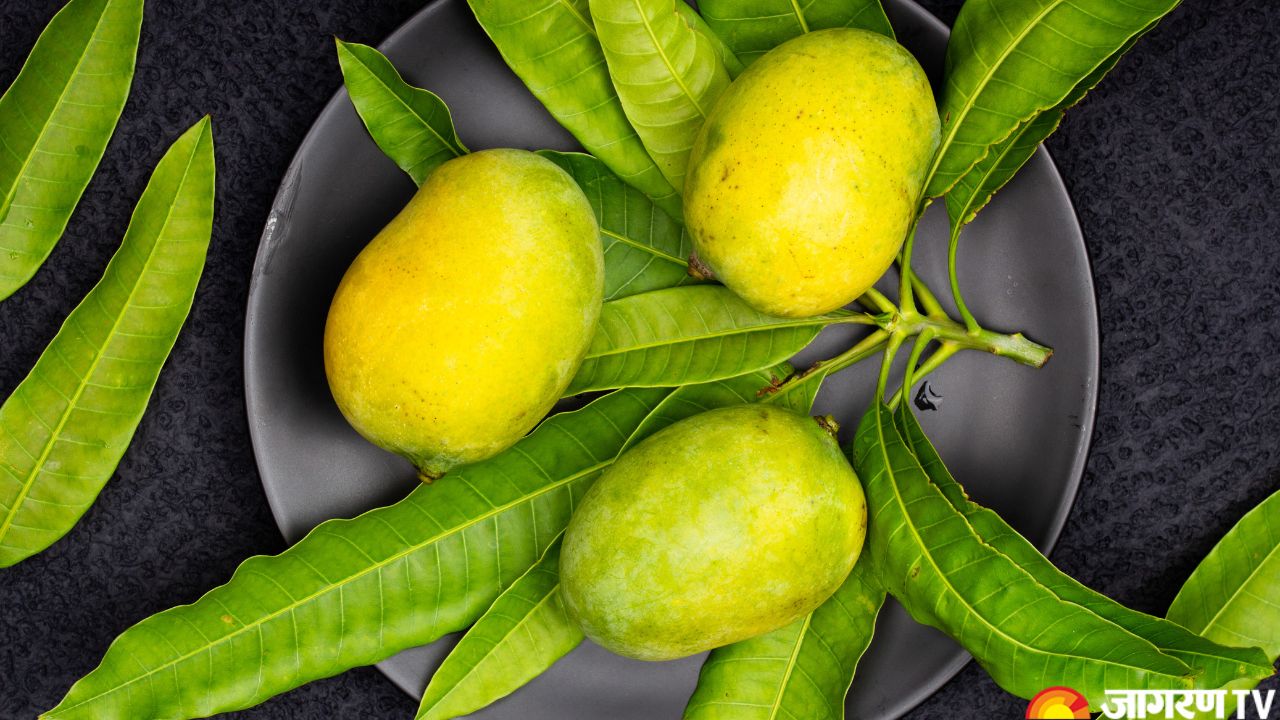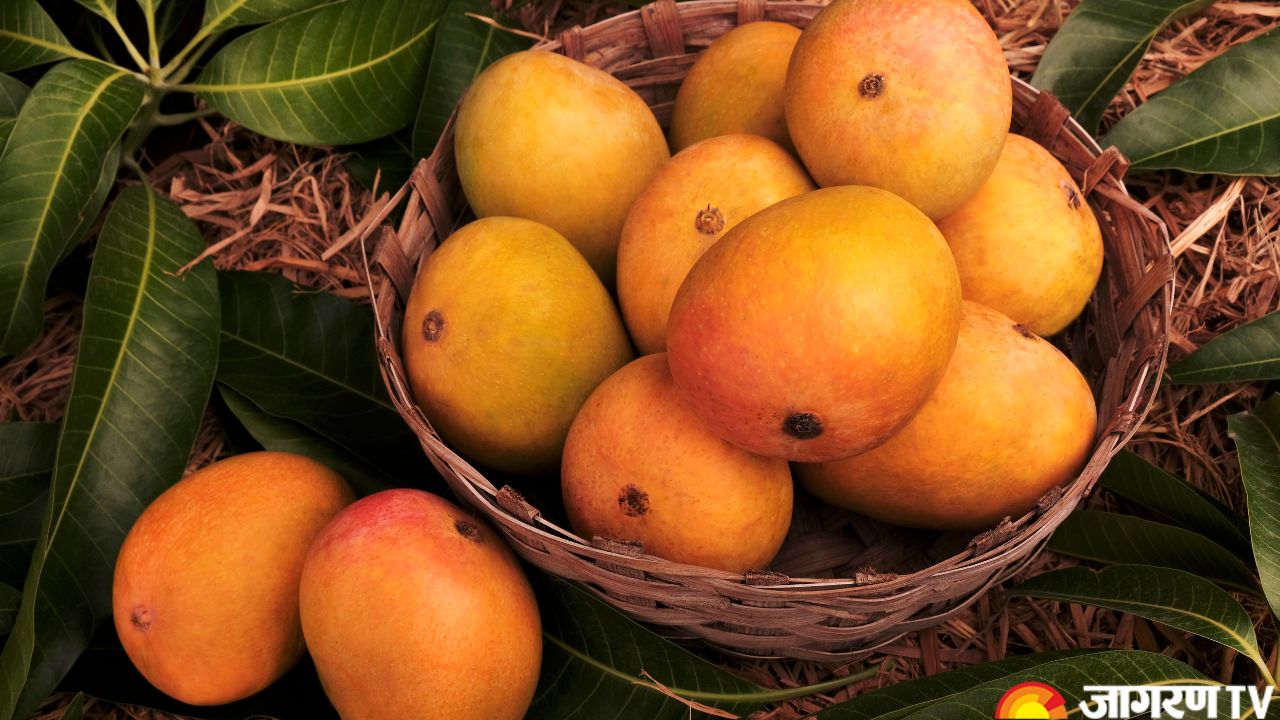National Mango Day 2025: Surprising Health Benefits of Mango Leaves, Know Risks, Consumption, and More

National Mango Day 2025: Mangoes are widely regarded as the “king of fruits” due to their luscious sweetness and vibrant flavour. While the fruit takes the stage, loaded with vitamins and antioxidants, a lesser-known but equally potent aspect of the mango tree is frequently overlooked: its leaves. These widely available leaves have long been used in numerous civilisations for their therapeutic benefits. Modern research sheds light on the science behind these traditional practices, with surprising health advantages.
Let us learn more about the various aspects of mango leaves, benefits, side effects, and more.
Mango Leaves Benefits
Mango leaves contain numerous useful components, including flavonoids, triterpenoids, and polyphenols, including mangiferin. These chemicals contribute to a variety of potential health benefits.
Blood Sugar Management
One of the most notable advantages of mango leaves is their ability to help control blood sugar levels. According to studies, mango leaf extracts may increase insulin production and glucose distribution, making them a viable natural therapy for diabetics or those at risk.
Antioxidant Powerhouse
The high quantity of antioxidants, particularly mangiferin, helps the body resist oxidative stress. This protects cells from free radical damage, potentially lowering the risk of chronic diseases such as heart disease and certain cancers.
Anti-inflammatory Properties
Mango leaves have strong anti-inflammatory properties that can help treat conditions like arthritis, gout, and other inflammatory disorders. This can help reduce discomfort and swelling.
Improves Digestion
Mango leaves have traditionally been used to promote intestinal health. They may be useful in the treatment of stomach ulcers and other digestive disorders due to their anti-inflammatory and antibacterial qualities.
Weight Management
According to some research, mango leaf extract may reduce fat storage and regulate metabolism, thereby benefiting in weight management.
Respiratory Relief
Mango leaves have traditionally been used to treat respiratory conditions such as asthma and bronchitis. The compounds in the leaves may help reduce inflammation in the respiratory tracts, resulting in better breathing.
Hair and Skin Health
Mango leaves contain antioxidants that can help improve skin health by protecting it from environmental damage and promoting collagen production. When applied topically, they may also improve scalp conditions and increase hair growth.
Kidney Stone Dissolution
Some traditional medicines say that mango leaves can aid in the removal of kidney stones. The specific mechanism is still being investigated; however, it is thought to be linked to their diuretic qualities.
Anxiety and Restlessness
Adding mango leaves to bathwater or drinking mango tea can help calm nerves and reduce anxiety and restlessness.
Mango Leaves Side Effects
-
As with any plant-based product, some people may have allergic responses, such as skin rashes or digestive distress. If you have a known allergy to mango fruit, be cautious with the leaves.
-
While mango leaf products are excellent for blood sugar management, people on diabetes medication should closely monitor their blood sugar levels to avoid hypoglycemia.
-
Excessive consumption may cause mild gastrointestinal issues such as diarrhoea or stomach cramps in some sensitive individuals.
-
There is little research on the link between mango leaf extracts and conventional medications. It is always essential to see a healthcare expert, especially if you are taking prescription medications, pregnant, or breastfeeding.
How to Use Mango Leaves?
Mango Leaf Tea
This is probably the most common and straightforward way to reap the advantages of mango leaves. To prepare, take 10-15 tender, fresh mango leaves and thoroughly clean them. In a saucepan, bring these leaves to a boil with about 3 cups of water. Allow the mixture to simmer gently for 10 to 15 minutes, or until the water changes colour and somewhat decreases, indicating that the beneficial chemicals have leached into the liquid. Once boiled, drain the liquid to remove the leaves, and the tea is ready to drink.
To maximise the potential health advantages of this tea, it is typically recommended that you drink it warm, preferably on an empty stomach in the morning. You can also add honey or lemon for added taste.
Powdered Form
Mango leaves can be finely ground to create a more concentrated and adaptable choice. Begin by properly washing fresh mango leaves, then drying them in a shaded place until they are brittle and crispy. This step is critical to preventing mould formation and producing a fine powder. After drying, use a blender, food processor, or coffee grinder to finely crush the leaves.
This powdered form can then be readily integrated into your everyday diet by mixing it with water, blending it into smoothies, or dusting it over various dishes.
External Applications
Mango leaves can also be applied topically to promote skin and hair health. Boil a handful of fresh mango leaves in water, then let the infusion cool completely. This cooled water can be used as a hair rinse to improve scalp health or applied directly to the skin with a cotton ball to treat a variety of skin issues. To relax and relieve anxiety, add a handful of fresh mango leaves to your bathwater and revel in their soothing effects.
Related Videos
-
22 Jul, 2025
National Mango Day 2025: Where was Mango First Cultivated? Interesting Facts About The King of ...
-
01 Jun, 2025
Summer Care Tips: Side Effects of Overeating Mangoes, Cold Drinks and Sugary Foods in Hotter ...
-
19 May, 2025
US rejects Indian Mangoes : अमेरिका ने वापस किए भारत के 15 आम ...
-
25 Apr, 2025
यह भी पढ़ें
-
09 Apr, 2023
IPL 2023 : आज हैदराबाद और पंजाब में कौन मारेगा बाजी, ऐसी हो सकती है दोनों टीम की प्लेइंग इलेवन
-
09 Apr, 2023
कोरियन दूल्हे ने इंडियन स्टाइल में की शादी, घोड़ी भी चढ़ा और भांगड़ा भी किया, वीडियो हुआ वायरल
-
09 Apr, 2023
-
09 Apr, 2023
आकांक्षा दुबे मामले में आरोपी समर सिंह को भीड़ ने दौड़ाया, 14 दिन की न्यायिक हिरासत








